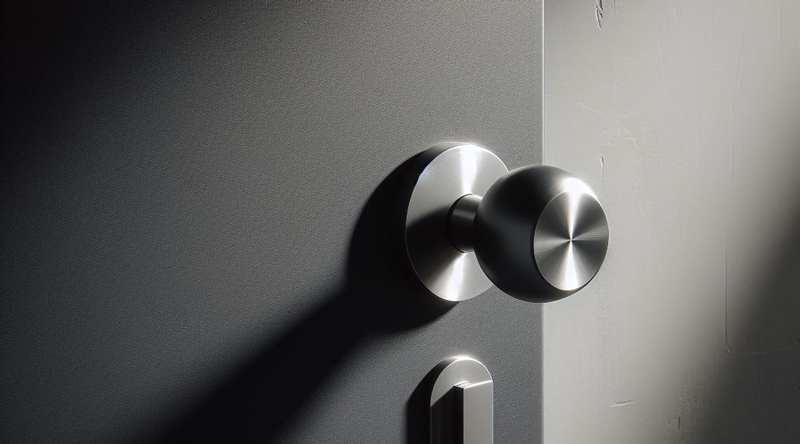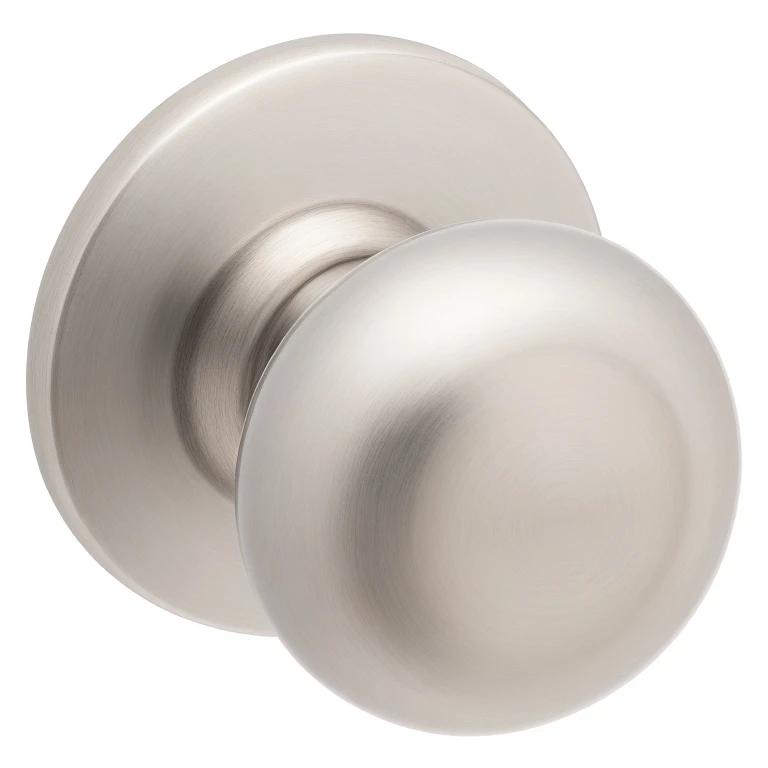If you live in a coastal climate, you might have noticed that your metal door knobs tend to corrode and rust over time.
Coastal environments pose unique challenges for door hardware, especially doorknobs, due to the corrosive nature of salt air.
This not only affects their appearance, but also their functionality and durability.
In this report, we will explore the best finishes for door knobs in coastal climates, drawing on the latest industry trends and expert recommendations.
The Challenge of Coastal Climates
Coastal environments are known for their corrosive nature, primarily due to the presence of salt in the air and water.
Salt can cause oxidation and corrosion in many common metals, damaging door knobs and other hardware.
Therefore, choosing the right door hardware materials and finishes is crucial. It ensures door knobs and hardware withstand coastal conditions without constant replacement or repair.
Corrosion-Resistant Finishes for Coastal Climates
When selecting finishes for door knobs in coastal areas, certain options stand out for their durability.
316 stainless steel, Satin Chrome, Antiqued Brass, Silicone Bronze, Nickel Plating, PVD finishes and some Oil-Rubbed finishes are generally favored for oceanfront doors (1).
These finishes are preferred because they are better at withstanding the elements, particularly the salt air that is characteristic of oceanfront properties.
Stainless Steel

Stainless steel resists corrosion, especially when mixed with other anti-corrosive metals. For oceanfront homes, 316 stainless steel is often suggested.
It has more molybdenum to better resist saltwater corrosion (2). This material is durable and maintains its look over time. That makes 316 stainless steel a popular choice for luxury door handles in coastal areas.
As a side note, here you will find my guide on the most popular door knob finishes.
Silicon Bronze
Silicon bronze is another material that performs well in coastal environments. It is known to oxidize in a manner that protects the underlying metal from further corrosion, a process that can be aesthetically pleasing as well as functional.
This characteristic makes silicon bronze a good choice for door hardware in beach houses and yachts, where exposure to harsh conditions is a given.
Physical Vapor Deposition (PVD) Finishes
PVD finishes have emerged as a preferred choice in 2024 due to their exceptional durability and resilience.
PVD is a coating process that deposits a thin, robust layer of material onto the hardware, providing an extra barrier against environmental factors.
This type of finish can be applied to various substrates, including stainless steel, to enhance their corrosion resistance even further. PVD finishes are not only tough but also come in a range of colors, allowing for customization without sacrificing durability (3).
Nickel Plating
High-quality door knobs with nickel plating are also recommended for their corrosion resistance.

Nickel plating can provide a layer of protection against moisture and salt, which is essential in humid environments. The Copper Creek Privacy Door Knobs are noted for their sturdy material and nickel plating, offering exceptional durability and strength (4).
Satin Chrome
Chrome is inherently corrosion resistant. It does not rust or tarnish easily, even when exposed to salt air and humidity. The chromium in chrome forms a protective oxidized layer that prevents further corrosion.
Satin chrome has a brushed finish that hides scratches and fingerprints. The brushed texture helps mask any minor scuffs or wear that could occur over time in a coastal environment.
Antiqued Brass
Antiqued Brass offers a traditional look that can be particularly resistant to the coastal environment when not lacquered.
It is important to avoid lacquered brass, as the lacquer is a thin varnish coating that can deteriorate, exposing the brass to oxidation and corrosion (5).
Oil-Rubbed Finishes
Some Oil-Rubbed finishes are engineered to resist corrosion and are suitable for coastal applications. The specific formulation and process used in creating these finishes contribute to their ability to hold up in harsh environments.
Finishes You Should Avoid In Coastal Climates
While the above finishes can protect your doorknobs from corrosion and rusting, there are also some finishes that you should avoid at all costs. These finishes are either too thin, too porous, or too reactive to withstand the salt spray and sea air of coastal environments.
Here are some examples of finishes that you should never choose for a doorknob in a coastal climate:
- Lacquered brass: Lacquer is a thin varnish coating applied to solid brass, ostensibly to prevent the brass from dulling down due to oxidation. However, when used externally this coating will peel off, exposing the brass underneath to corrosion and tarnishing. Lacquered brass doorknobs will quickly lose their shine and become dull and discolored near the sea.
- Painted metal: Paint is another coating that is often used to cover metal door knobs, either for aesthetic or protective purposes. However, paint is only suitable for indoor hardware, as it is not durable enough to resist the elements. Painted metal door knobs will chip, crack, and fade under the sun, rain, and salt spray. Moreover, paint can trap moisture and dirt under its surface, accelerating the corrosion process of the metal beneath.
- Aluminum: Aluminum is a lightweight and inexpensive metal that is often used for door hardware. However, aluminum is also highly reactive and prone to oxidation, especially in coastal climates. Aluminum door knobs will form a white, powdery layer of aluminum oxide on their surface, which can flake off and expose the metal to further corrosion. Aluminum door knobs can also pit and corrode due to galvanic reactions with other metals, such as steel screws or hinges.
- Iron: Iron is a strong and sturdy metal that is commonly used for door hardware. However, iron is also very susceptible to rusting, especially in humid and salty environments. Iron door knobs will turn brown and brittle over time, losing their strength and functionality. Iron door knobs can also stain the door and the surrounding area with rust marks, which are difficult to remove. To prevent this, iron door knobs must be coated with a protective layer, such as zinc plating or powder coating.
The Importance of Material Selection
In addition to the finish, the underlying material of the doorknob plays a crucial role in its longevity.
Marine-grade materials designed for beach properties, such as those used in luxury yacht interiors, offer enhanced resistance to the corrosive effects of salt air and sea water (2). These materials, coupled with the right finish, can significantly extend the lifespan of doorknobs in coastal regions.
Maintenance and Care
While the materials and finishes mentioned above are known for their durability, regular maintenance is still crucial to ensure their longevity in coastal climates.
Regular cleaning to remove salt and other deposits can prevent the onset of corrosion and maintain the aesthetic quality of the hardware.
Additionally, applying a protective wax or sealant can provide an extra layer of defense against the elements.
Final Thoughts
As you can see, the most durable finishes for door knobs in coastal climates are those that offer superior corrosion resistance and can withstand the harsh environmental conditions typical of these areas.
316-grade stainless steel, silicon bronze, satin chrome, antiqued brass, PVD finishes, and high-quality nickel-plated door knobs stand out as the best choices for homeowners looking to combine functionality with style.
These finishes, particularly when applied over marine-grade materials, provide the best combination of resilience and aesthetic appeal for oceanfront homes. By selecting the appropriate materials and finishes and adhering to a regular maintenance schedule, you can ensure that your door hardware remains functional and attractive for years to come.











